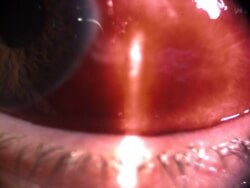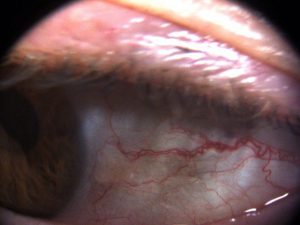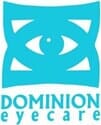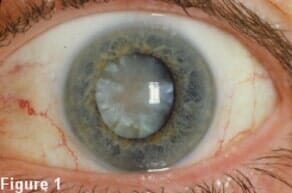
Common Eye Diseases
Cataract
A Cataract is a clouding of the crystalline lens of the eye or in its envelope or capsule. (See figure 1)
It may cause a slight decrease in vision early to almost a total blur later.
In early development a simple prescription change may help to improve vision.
As the cataract worsens or gets darker vision will worsen until the person cannot do normal tasks such as drive read or watch TV.
Both eyes are usually affected but usually one eye is affected earlier than the other.
At some point surgery is the only option.
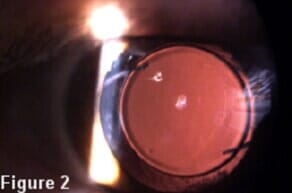
If surgery is needed there are several things you need to know:
- With a good Surgeon performing the procedure it is bloodless and painless and takes only about 10 minutes
- The cloudy lens is removed and a new Intraocular Lens Implant(IOL) is placed in the eye
Good vision is restored almost immediately (see figure 2) although you may still may need glasses after surgery
Prior to surgery there are some decisions you have to make concerning the type of IOL you will have implanted:
- If you choose a Monofocal lens you will have much improved vision for distance but will have to wear reading glasses or bifocals in order to see up close. These lenses are usually covered in full by your insurance company.
- If your eye has an irregular shape (astigmatism) you may need a special Toric lens to give you good distance vision without glasses. Again you will need reading glasses for up close vision. A Toric lens is not covered by your insurance.
- If you want good distance and up close vision you will need a Multifocal or Bifocal implant. These also are not covered by your insurance company.
- If you need cataract surgery we will discuss these options with you before you see the surgeon so that there will be no surprises.
After surgery your vision will be greatly improved but you may still need glasses for better distance and near.
Medicare Insurance may cover one pair of glasses after cataract surgery.
Please bring your insurance card with you to your visit.
Conjunctivitis
Conjunctivitis Is An Infection Or Inflammation Of The Conjunctiva Or Thin Film Over The White Of The Eye. It Can Be Classified As One Of The Following:
- Allergic, Either Seasonal Or Perennial
- Bacterial
- Viral
Depending On The Cause, Either Antihistamine, Antibiotic ,Anti-Inflammatory Or Anti Viral Drops Will Be Prescribed.
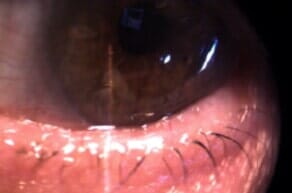
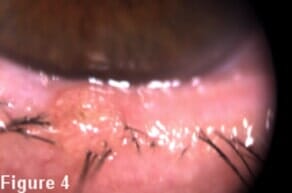
Skin Cancers Around The Eyes
Skin Cancers around the eyes (see figure 4) are always very serious and need immediate attention. We always refer suspicious skin lesions to a skilled Plastic Surgeon for biopsy and /or treatment.
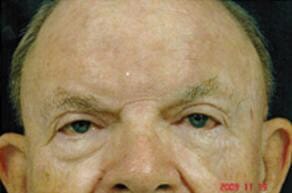
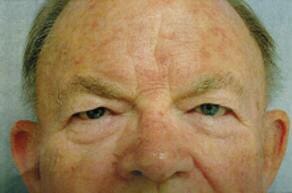
Photos courtesy of Jonathan Jacobs M.D.
Droopy Eye Lids May Be Caused By Any Of The Following:
- Stretched skin
- Muscle damage
- Nerve damage
If the drooping eyelid caused significant visual field obstruction then your insurance company may consider the need for corrective surgery a medical necessity and not a cosmetic procedure. We do specialized tests to help determine if your insurance will cover this procedure and help get you a skilled Plastic surgeon. Bilateral Blepharoplasty
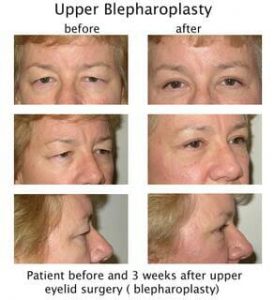
Photos courtesy of Anna Drzewiecki, M.D.at annamd.com
 Glaucoma Is Progressive Disease That Affects The Optic Nerve In The Eye.
Glaucoma Is Progressive Disease That Affects The Optic Nerve In The Eye.
There are several risk factors that need to be checked on a regular basis and include the following:
- Increased pressure in the eye
- Changes in appearance of the optic nerve
- Thickness of the cornea
- Internal eye changes
- If untreated, blindness will result
If multiple risk factors are present, other more specific tests such as:
- Internal eye changes
- Visual field measurement
- Retinal Nerve Fiber Layer imaging
If glaucoma is diagnosed treatment can be either drops and/or surgery.
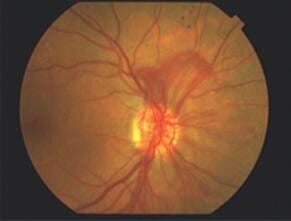 Diabetes And Eye Complications
Diabetes And Eye Complications
If you have diabetes it is very important to maintain a normal blood sugar level for many reasons. If your blood sugar is elevated for extended periods you may have multiple eye complications including the following:
- Bleeding in the eye
- Protein leakage from the blood vessels
- Swelling of the macula which will cause decreased vision
- The formation of new fragile blood vessels which are prone to rupture and fill the eye with blood and greatly reduce vision.
Annual eye exams for those with Diabetes are usually covered by most insurances and can detect these problems before major damage can occur.
Dry Eye Problems
The normal tear has three layers, mucin, aqueous, and lipid layer. If any of these layers does not function properly then you will have a dry eye. Some of the symptoms of dry eyes are:
Some of the symptoms of dry eyes are:
- The eyes water because a message is sent to the brain stating the eyes are dry and the brain opens the lacrimal gland and excess water is sent to the eye.
- Red eyes
- Foreign body sensation or gritty feeling
- Decreased vision because the front surface becomes irregular in shape from being dry.
Dry eyes are usually treated with drops to replace the damaged layer or in severe cases other treatments are used.
Seasonal Eye Allergies
If your eye are red, itchy and uncomfortable, you may be one of the millions who suffer from seasonal allergic conjunctivitis.
The signs and symptoms of allergic conjunctivitis are:
- Itching
- Redness
- Tearing
- Discomfort
- Swelling
- Foreign body sensation (the feeling that something is in your eye)
- Burning/stinging
Subconjuntival Hemorrhage occurs when a small blood vessel located between the white of the eye and the clear layer over it (the conjunctiva) breaks. You will usually not feel this happen and unless someone else tells you or you look in the mirror, you will not know when it happened. some of the common causes are:
- Coughing
- Sneeze
- Heavy Lifting
- Rubbing your eye
